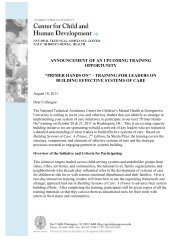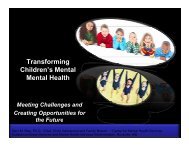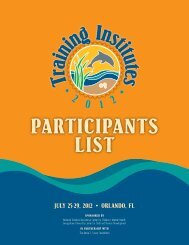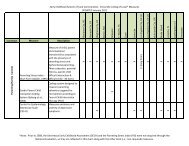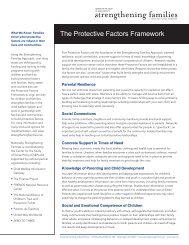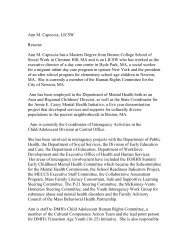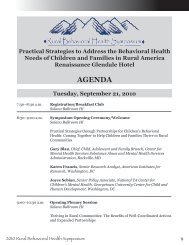Training Institutes 2012 - National Technical Assistance Center for ...
Training Institutes 2012 - National Technical Assistance Center for ...
Training Institutes 2012 - National Technical Assistance Center for ...
Create successful ePaper yourself
Turn your PDF publications into a flip-book with our unique Google optimized e-Paper software.
• Developing Community Partnerships in Child Welfare (<strong>National</strong> Child Welfare Resource <strong>Center</strong> <strong>for</strong> Organizational Improvement)<br />
• GAO Report: HHS Guidance Could Help States Improve Oversight of Psychotropic Prescriptions (U.S. Government<br />
Accountability Office, December 2011)<br />
• Helping Child Welfare Workers Support Families with Substance Use, Mental, and Co-Occurring Disorders—<strong>Training</strong><br />
Toolkit [Six Modules] (<strong>National</strong> <strong>Center</strong> on Substance Abuse and Child Welfare) Available at:<br />
http://www.ncsacw.samhsa.gov/training/toolkit/default.aspx<br />
• Improving Child Welfare Outcomes through Systems of Care: Building the Infrastructure—A Guide <strong>for</strong> Communities (G.<br />
DeCarolis, L. Southern & F. Blake, <strong>National</strong> <strong>Technical</strong> <strong>Assistance</strong> and Evaluation <strong>Center</strong> <strong>for</strong> Systems of Care)<br />
• Improving Child Welfare Outcomes through Systems of Care: Systems of Care—A Guide <strong>for</strong> Strategic Planning<br />
(Administration <strong>for</strong> Children and Families, 2010)<br />
• Integrating Systems of Care: Improving the Quality of Care <strong>for</strong> the Most Vulnerable Children and Families (S. Hornberger,<br />
T. Martin & J. Collins, Child Welfare League of America, Inc., 2006)<br />
• Interagency Collaboration: A Closer Look (<strong>National</strong> <strong>Technical</strong> <strong>Assistance</strong> and Evaluation <strong>Center</strong> <strong>for</strong> Systems of Care, 2008)<br />
• Learning Tool 16: Understanding the Common Ground Between Systems of Care and Child Abuse Prevention (FRIENDS<br />
<strong>National</strong> Resource <strong>Center</strong> <strong>for</strong> Community-Based Child Abuse Prevention CBCAP, March 2010)<br />
• Mental Health Treatment of Infants and Toddlers: Creating an Integrated System of Care <strong>for</strong> Infants and Toddlers in the<br />
Child Welfare System (K. Orfirer & J. Rian, 2008)<br />
• Multiple Response System and System of Care: Two Policy Re<strong>for</strong>ms Designed to Improve the Child Welfare System<br />
(<strong>Center</strong> <strong>for</strong> Child and Family Policy, 2009)<br />
• <strong>National</strong> <strong>Center</strong> on Substance Abuse and Child Welfare Online Tutorials. Available at:<br />
http://www.ncsacw.samhsa.gov/training/default.aspx<br />
• NSCAW II Baseline Report: Children’s Services (H. Ringeisen, C. Casanueva, K. Smith, & M. Dolan, Office of Planning,<br />
Research and Evaluation, Administration <strong>for</strong> Children and Families, U.S. Department of Health and Human Services, 2011)<br />
• Oversight of Psychotropic Medication <strong>for</strong> Children in Foster Care; Title IV-B Health Care Oversight & Coordination Plan—<br />
In<strong>for</strong>mation Memorandum (Administration <strong>for</strong> Children and Families, U.S. Department of Health and Human Services,<br />
April 11, <strong>2012</strong>)<br />
• Parental Substance Abuse and the Child Welfare System (Child Welfare In<strong>for</strong>mation Gateway, 2009)<br />
• Promoting Social and Emotional Well-Being <strong>for</strong> Children and Youth Receiving Child Welfare (Administration <strong>for</strong> Children<br />
and Families, U.S. Department of Health and Human Services, April 17, <strong>2012</strong>)<br />
• Resources on Collaboration between Mental Health and Child Welfare Systems (K. Helfgott, <strong>Technical</strong> <strong>Assistance</strong><br />
Partnership <strong>for</strong> Child and Family Mental Health)<br />
• Solutions Storytelling: Messaging to Mobilize Support <strong>for</strong> Children’s Issues (Child Advocacy 360 Foundation, 2010)<br />
• Systems of Care: A Complete Reference Guide <strong>for</strong> Putting SOC in Action (Delaware Children’s Department, 2007)<br />
• Understanding the Common Ground (FRIENDS <strong>National</strong> Resource <strong>Center</strong> <strong>for</strong> Community-Based Child Abuse<br />
Prevention, 2009)<br />
• Voice: Ensuring Stability <strong>for</strong> Children at Home and in School (Casey Family Services, Winter 2010)<br />
• You Are Not Alone: An Empowering Guide <strong>for</strong> Parents Whose Children Are in DCF Foster Care (Parents Helping Parents, 2010)<br />
Services <strong>for</strong> Youth in the Juvenile Justice System<br />
• A Primer <strong>for</strong> Mental Health Practitioners Working With Youth Involved in the Juvenile Justice System (R. Kinscherff,<br />
<strong>Technical</strong> <strong>Assistance</strong> Partnership <strong>for</strong> Child and Family Mental Health, Washington, DC, <strong>2012</strong>)<br />
• Blueprint <strong>for</strong> Change: A Comprehensive Model <strong>for</strong> the Identification and Treatment of Youth with Mental Health Needs in<br />
Contact with the Juvenile Justice System (K. Skowyra & J. Cocozza, The <strong>National</strong> <strong>Center</strong> <strong>for</strong> Mental Health and Juvenile<br />
Justice, Policy Research Associates, Inc., 2007)<br />
• Children, Youth and Mental Illness: Working with the Juvenile and Criminal Justice System—What You Need to Know<br />
(<strong>National</strong> Federation of Families <strong>for</strong> Children’s Mental Health, 2010)<br />
• Focal Point: Corrections (Research and <strong>Training</strong> <strong>Center</strong> on Family Support and Children’s Mental Health, Portland State<br />
University, Summer 2006)<br />
• Impact of Systems of Care on Juvenile Justice-Related Outcomes (TA Partnership, 2011)<br />
• Improving the Effectiveness of Juvenile Justice Programs: A New Perspective on Evidence-Based Practice (M. Lipsey, J.<br />
Howell, M. Kelly, G. Chapman, & D. Carver, <strong>Center</strong> <strong>for</strong> Juvenile Justice Re<strong>for</strong>m, December 2010)<br />
• Juvenile Diversion: Programs <strong>for</strong> Justice-Involved Youth with Mental Health Disorders (K. Skowyra & S. Powell, <strong>National</strong><br />
<strong>Center</strong> <strong>for</strong> Mental Health and Juvenile Justice, June 2006)<br />
• Juvenile Justice and Mental Health—Working Together <strong>for</strong> Youth with Serious Emotional Disorders (J. Burrell, TA<br />
Partnership, AIR)<br />
<strong>Training</strong> <strong>Institutes</strong> <strong>2012</strong><br />
FLASH DRIVE MATERIALS<br />
155



